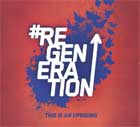
#ReGENERATION: The Politics of Apathy & Activism 2012
Distributed by Media Education Foundation, 60 Masonic St., Northampton, MA 01060; 800-897-0089
Produced by Anonymous Content and Engine 7 Films
Directed by Philip Montgomery
DVD , color, 81 min.
Sr. High - General Adult
Adolescence, Economics, Education, Ethics, Human Rights, Information Literacy, Media Studies, Popular Culture, Sociology, Urban Studies
Date Entered: 03/07/2013
Reviewed by Jason R. Harshman, The Ohio State University#ReGENERATION poses a number of questions and offers a list of culprits to explain why today’s generation of young people do not possess the same sense of urgency to change American society for the better as activists of the 1950s and 1960s. Interview excerpts with a white, married couple, a few students and a teacher from one high school in Minneapolis, Minnesota, well-known scholars such as Noam Chomsky and Howard Zinn, and artist and social activist Talib Kweli are used to address the current sense of apathy possessed by so many in America. Consequently, a film that aims to inspire viewers to take action spends a prolonged amount of time on forces that repress people rather than highlighting ways to direct frustration towards informed, active citizenship. This is seen most clearly through the interviews with students at the school in Minneapolis who sit around a table talking about themselves and what they don’t like but not what they have done to create change in their community and beyond.
The first half of #ReGENERATION serves as an overview of common tropes used to explain problems in society: corporate control of media, capitalism and consumerism as tools for distracting citizens from real public policy issues and other issues of inequality, parenting, economic inequality, and the role of education in perpetuating passive citizenship. The film also includes a lengthy analysis of the narrative that has been constructed to teach and maintain the myths of American history. Attention to how the “real” story of Christopher Columbus is left out of classrooms is used as one example of how school curricula need to be problematized to engage students in critical thinking about why problems that have existed for generations remain.
The film effectively brings together multiple issues present throughout many aspects of our lived experiences: government, education, the marketplace, entertainment, and childhood, to name a few. While there is room to consider how the issues and forces for change must look beyond national borders—the film is very American-centric—the filmmakers raise a number of questions that make this a film worth incorporating into multiple classrooms at multiple levels. If we are to educate students to be informed, active citizens, then films like #ReGENERATION can serve as starting points for critical self-reflection on how to progress from identifying problems to collaborating for positive change across time and space.